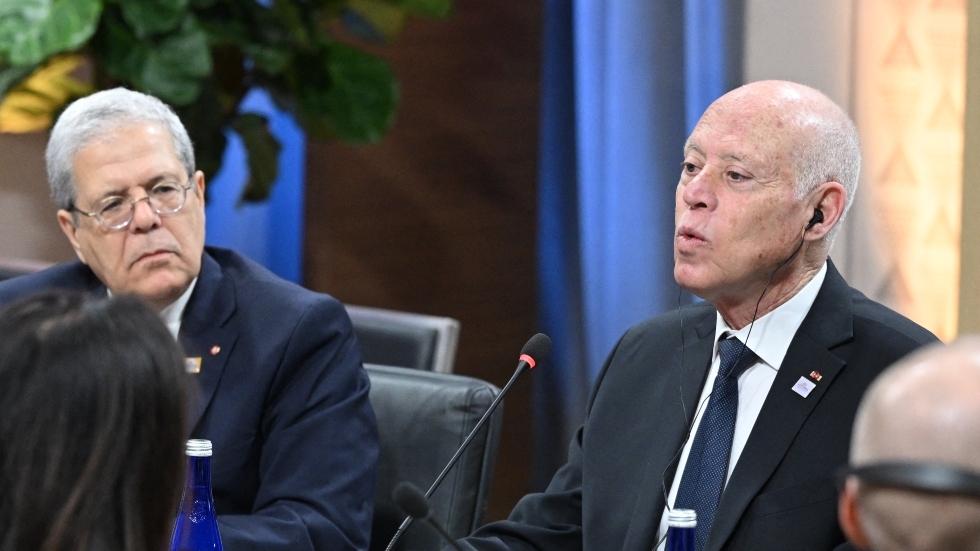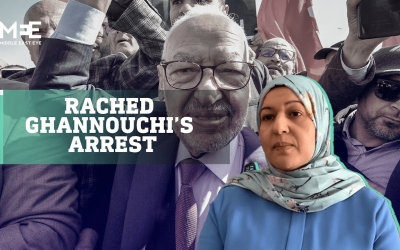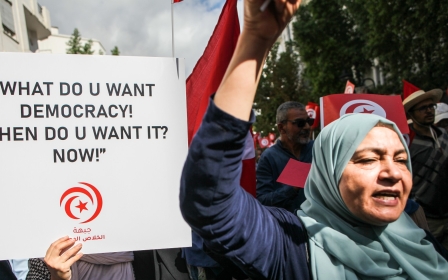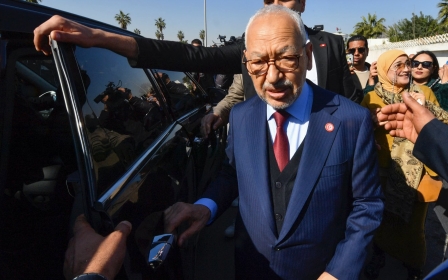Former US officials, academics demand Biden suspend assistance to Tunisia government

A coalition of US academics, former American officials and rights activists have come together to publish a letter demanding that President Joe Biden suspend all assistance to the Tunisian government over its continued crackdown on civil society and opposition figures.
The letter, signed by nearly two dozen people including former ambassador to Tunisia Jake Walles, ex-deputy national security advisor Elliot Abrams, and former US diplomat Stephanie Williams, further called on Washington to impose sanctions on Tunisian President Kais Saied and other officials in the ministers of interior, defence, and justice.
"The United States should not reward such behavior with aid, loans, praise, and photo-ops," the letter said.
"Lending our taxpayer dollars and legitimacy to Saied will only encourage other populist leaders to believe that they too can get away with dismantling democratic institutions. If the US is truly serious about shoring up democracies worldwide, it must send a signal that there are real costs to democratic backsliding."
Since July 2021 when Saied unilaterally suspended parliament and dissolved the government, Tunisia has been engulfed in a deepening political crisis and a growing crackdown on opposition groups.
New MEE newsletter: Jerusalem Dispatch
Sign up to get the latest insights and analysis on Israel-Palestine, alongside Turkey Unpacked and other MEE newsletters
The North African nation held parliamentary elections in December last year, which rights groups and Saied's political opponents have widely labelled a sham.
Just 11 percent of eligible voters cast ballots in an election marked by widespread apathy and where political parties were banned from participating.
In recent weeks, the Tunisian leader has embarked on what Amnesty International describes as a "politically motivated witch hunt", with authorities arresting dozens of political activists, judges and lawyers.
The most prominent of the arrests was Rached Ghannouchi, the most senior member of the Ennahda party who was arrested by Tunisian police.
Last week, the movement was banned from holding meetings in the country by a decree from the Ministry of Interior, while the National Salvation Front, another opposition group, was banned from meeting in Tunis.
Continued US support
Despite this crackdown, the Biden administration has maintained levels of security assistance to the country while downsizing some sources of economic aid to Tunisia in its budgets for 2023 and 2024.
The lack of cuts to security assistance has been criticised by leading American lawmakers like Senator Chris Murphy, who recently said during an event at the US Institute of Peace: "The budget requests we're getting for Tunisia and the policy that we see from the administration still, basically look like business as usual."
In late March, a group of 20 Democratic members of US Congress also sent a letter to Secretary of State Antony Blinken, warning that the "stark" acceleration in Tunisia's shift towards authoritarianism was posing grave concerns for the US-Tunisia relationship.
But even amid this concern from Congress, the US is looking to expand its bilateral military partnership with Tunisia. Brigadier General David Pritchett, director of joint staff at the Wyoming National Guard, told Middle East Eye last month that "the relationship is absolutely growing".
"Our goal should be to incentivize Tunisians across the political spectrum and across state institutions to reconsider the dangers of dictatorship, which, once entrenched, will be difficult to undo," the letter said.
The letter also urged the Biden administration to pressure the International Monetary Fund (IMF) to place conditions on a $1.9bn loan to Tunisia, which would provide a lifeline to the country amid an implosion of its economy.
Tunisia is currently wracked by high inflation and shortages of basic commodities from fuel to cooking oil, a crisis exacerbated by the war in Ukraine.
According to the letter, the conditions that should be placed on the IMF loan include releasing political prisoners as well as establishing a "genuinely inclusive national dialogue" and a political roadmap for the country.
"After all, Saied’s government will be hard-pressed to follow through on its proposed economic reforms without the support of the major political parties, labor unions, and civil society organizations," it said.
Middle East Eye delivers independent and unrivalled coverage and analysis of the Middle East, North Africa and beyond. To learn more about republishing this content and the associated fees, please fill out this form. More about MEE can be found here.





